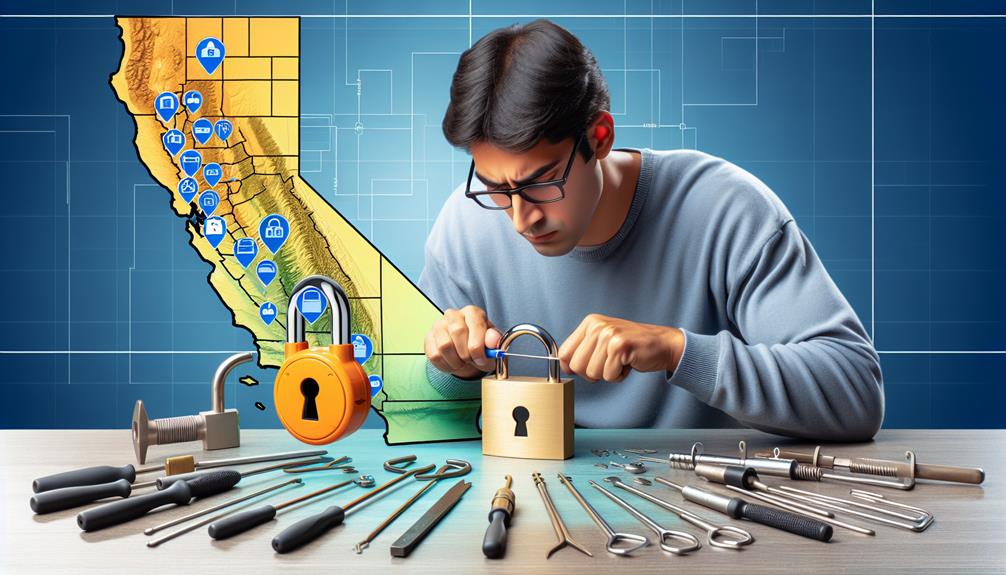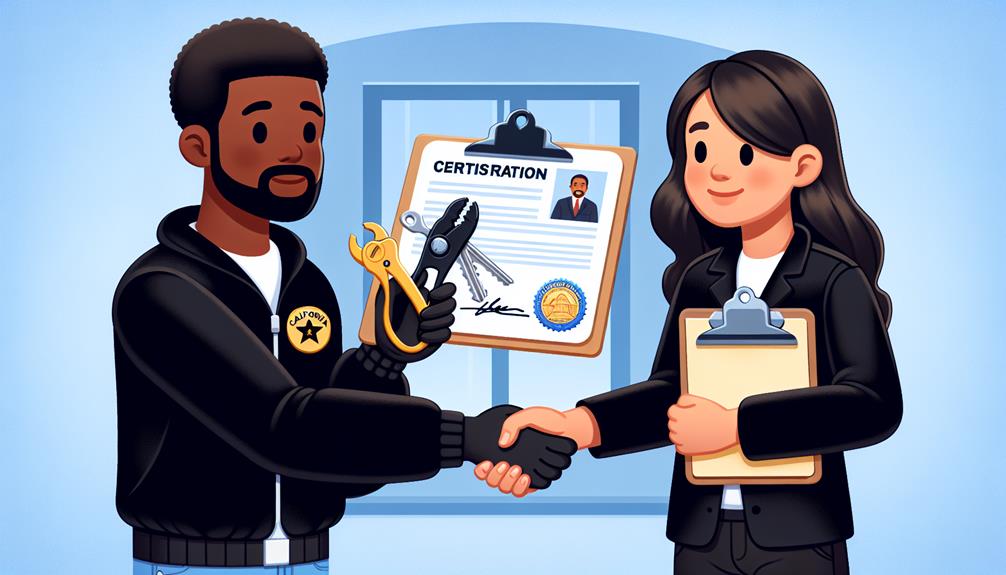Ah, California, the land of opportunity, where even your dreams of lock-picking legality can come true. If you’re considering a career that allows you to be the hero in a lockout situation, you’ll find that becoming a locksmith in the Golden State isn’t as simple as picking a lock.
You’ll need to tackle a series of requirements, including specific training programs that are as precise and intricate as the mechanisms you’ll be working with. As you contemplate the tools of the trade, remember that licensure is a necessary key in your professional toolkit. The process of becoming a registered locksmith involves not only honing your skills but also understanding the legalities and ethical implications of your work.
You’re likely wondering about the potential earnings and the pathways to take your locksmithing aspirations to the next level. Hang tight, as we’re about to explore the steps you’ll need to take to open the door to a successful locksmith career in California, where the market is as diverse as the locks you’ll encounter.
Key Takeaways
- Locksmiths in California must be registered with the state and obtain the necessary licenses to operate legally.
- There are no specific educational requirements or training programs mandated by the state, but proper training is still important for success as a locksmith.
- Locksmith businesses, including sole proprietorships, require a locksmith business license from the Bureau of Security and Investigative Services (BSIS).
- Individuals employed as locksmiths need to be registered and licensed as locksmith employees, and locksmith contractor licenses are required for high-value locksmith works.
Understanding Locksmithing Basics

Grasping the essentials of locksmithing is a crucial step for anyone aspiring to excel in this skilled trade within California’s regulatory framework. As you embark on this journey, it’s important to understand that your expertise could unlock a variety of career opportunities. The locksmith job outlook is generally favorable, as security concerns and innovations in locking mechanisms continue to drive demand for skilled professionals.
In California, becoming a locksmith means you’ll engage in activities such as rekeying, lock installation, repair, and modification. You’ll also be involved in key creation, transponder key electronic cloning, and automotive key programming. Key duplication alone doesn’t classify you as a locksmith under state law, but it’s one of the many services you can offer.
To legally operate, you must be registered with the state. This includes meeting general eligibility requirements such as being 18 years old, completing high school, and passing a criminal background check. Remember, your ability to navigate California’s regulatory landscape will be as critical as your technical skills. Stay informed, stay compliant, and you’ll be well on your way to a rewarding locksmith career.
Pursuing Locksmith Training

Embarking on locksmith training equips you with the essential skills and knowledge necessary to excel in this specialized trade. While California doesn’t mandate specific educational qualifications for locksmiths, acquiring formal training is crucial for mastering the craft and enhancing your career opportunities. Look for a reputable locksmith school or trade association offering certificate and diploma courses. These programs cover a variety of topics, from the basics of lock mechanisms to the intricacies of key making and safe servicing.
As you’re seeking to establish yourself in this field, consider finding apprenticeships. These hands-on experiences under skilled mentors can be invaluable, offering real-world insights that complement your formal education. Apprenticeships not only help in honing your technical abilities but also provide a pathway to professional networking and potential job openings.
Registering as a Locksmith Employee

Once you’ve acquired the necessary skills through training or an apprenticeship, you’ll need to register as a locksmith employee in California to legally perform locksmithing work. While obtaining a locksmith certificate isn’t mandated by the state, it can bolster your expertise and employability.
Before you can register, however, you’ll undergo criminal background checks for locksmith employees. This process ensures public safety and trust in locksmith services.
To begin, submit an application to the Bureau of Security and Investigative Services (BSIS). The application includes a $55 fee and requires a Locksmith Employee Live Scan form, which facilitates the criminal background check through the California Department of Justice (DOJ) and the Federal Bureau of Investigation (FBI).
Once cleared, you’ll receive a Pocket Registration Card, which you must carry as identification while working.
Starting a Locksmith Business

If you’re ready to take the leap into entrepreneurship, starting your own locksmith business in California requires careful planning and adherence to specific state regulations. Ensure you’re fully licensed and registered with the Bureau of Security and Investigative Services (BSIS), a crucial step before you can legally operate. With your paperwork in order, it’s time to focus on customer acquisition and marketing strategies.
Developing a strong brand and online presence is essential. Invest in a professional website and leverage social media to reach potential customers. Local SEO tactics will help your business appear in search results when individuals in your area need locksmith services. Networking with related businesses, such as real estate agencies and security firms, can also provide valuable referrals.
Offering exceptional service is your best marketing tool. Satisfied customers are likely to recommend your business, so ensure you’re knowledgeable, reliable, and professional in every interaction. Remember, word-of-mouth can significantly drive your business growth.
Keep abreast of industry trends and new technologies to stay competitive. Diversifying your services to include smart lock installation and advanced security solutions can set you apart. With the right approach, your locksmith business in California can thrive.
Licensing Requirements for Business
Every person, partnership or company looking to get a license as a locksmith in California must state who will run the business on a day to day basis. Moreover, every applicant must undergo a criminal history review by the Department of Justice and Federal Bureau of Investigation. Also, a company that receives over $500 for a single job will be required to be a licensed contractor. It’s also important to note that the local government may require a business permit.
The Application Process
Every individual or company seeking to apply must submit an application along with:
- $75 license fee
- Two clear and quality passport photographs
The person will also need to submit a Locksmith Company Live Scan form that must be signed by the Live Scan Operator. Furthermore, each applicant is also required to pay a $32 DOJ fingerprint processing fee, $17 fingerprint processing fee as well as the Live Scan site processing fee. The package will then be submitted to the Bureau of Security and Investigation Services in Sacramento. An applicant seeking a license under a fictitious business name must provide an application that includes a certified copy of the fictitious business name statement filed with the County Clerk. This application can be found online.
Now, once the application has been reviewed by the Bureau and all necessary criminal clearances has been granted, you’ll be able to find the processed application on the Bureau’s website. The main locksmith registration will be sent to the applicant by mail within 10 to 15 business days.
Note: You should remember that California requires every locksmith to maintain a current license as well as a renewal certificate which must be clearly displayed at all times. Opening a physical office also attracts a $35 fee.
Advancing With a Contractor License

As you establish your locksmith business in California, obtaining a contractor license can significantly expand the range of services you’re able to offer, especially for jobs valuing over $500. Expanding locksmith services to include more complex and higher-value projects not only increases revenue but also enhances your reputation as a full-service provider.
When considering obtaining a contractor license, imagine the new opportunities:
- Commercial Projects:
- High-security system installations
- Master key system setups for large complexes
- Residential Upgrades:
- Advanced home security solutions
- Comprehensive lock and hardware renovations
Pursuing a contractor license means you’re serious about your trade and committed to adhering to the stringent standards that California mandates. This commitment reflects your professionalism and dedication to excellence, assuring clients of your expertise and trustworthiness.
To embark on this journey, you’ll need to pass the Lock and Security Equipment (C-28) Examination. This requires a solid understanding of various aspects of locksmithing, from planning and estimation to intricate alarm system servicing. Success in this examination is a testament to your skills and marks a significant milestone in your professional development.
Frequently Asked Questions
What Is the Average Salary Range for a Locksmith in California, and How Does It Vary With Experience?
You’re eyeing a locksmith career in California, where salaries typically range from $30,000 to $60,000. Seasoned pros, with years under their belts, command the higher end.
Starting out, you might land an apprenticeship paying less, but as your skills sharpen, you’ll have leverage in salary negotiations.
Experience not only boosts your paycheck but also your value to employers, paving the way for a more lucrative future.
Are There Any Ongoing Continuing Education Requirements for Locksmiths in California to Maintain Their Registration or License?
In California, you’re not required to pursue continuing education for maintaining your locksmith registration or license. However, staying updated with industry trends through locksmith associations is beneficial. It’ll keep your skills sharp and services competitive.
Although not mandated, embracing ongoing learning can significantly bolster your professional growth in the dynamic locksmithing landscape. Keep an eye on new technologies and best practices to stay ahead in the field.
Can a Locksmith From Another State Transfer Their Registration or License to Work in California, and What Is the Process for Doing So?
California doesn’t offer license reciprocity, so you’ll need to start fresh. Submit a new application to the Bureau of Security and Investigative Services (BSIS). You’ll undergo a background check and meet all state-specific requirements.
The application procedures are clear-cut but require attention to detail to ensure your eligibility. Your existing knowledge will be a solid foundation, but California’s unique standards will guide your new registration process.
How Does One Handle Customer Disputes or Service Complaints as a Licensed Locksmith in California?
To handle customer disputes or service complaints, you’ll need to exercise conflict resolution skills to maintain customer satisfaction. Listen attentively to the client’s concerns, offer practical solutions, and communicate clearly.
It’s essential to remain professional, calm, and empathetic throughout the process. Addressing issues promptly and effectively can turn a negative situation into a positive experience, reflecting well on your professionalism and dedication to quality service.
Are There Any Specific Insurance or Bonding Requirements That California Locksmiths Must Meet to Protect Their Business and Clients?
Yes, as a locksmith in California, you’ll need specific insurance policies and bonding to safeguard your business and clients. It’s crucial to consult with professional insurance agents and bonding agencies to secure the proper coverage.
These measures protect against potential liabilities and ensure financial security for both you and your customers. Don’t overlook this step; it’s a fundamental aspect of establishing a trustworthy and compliant locksmith operation.






